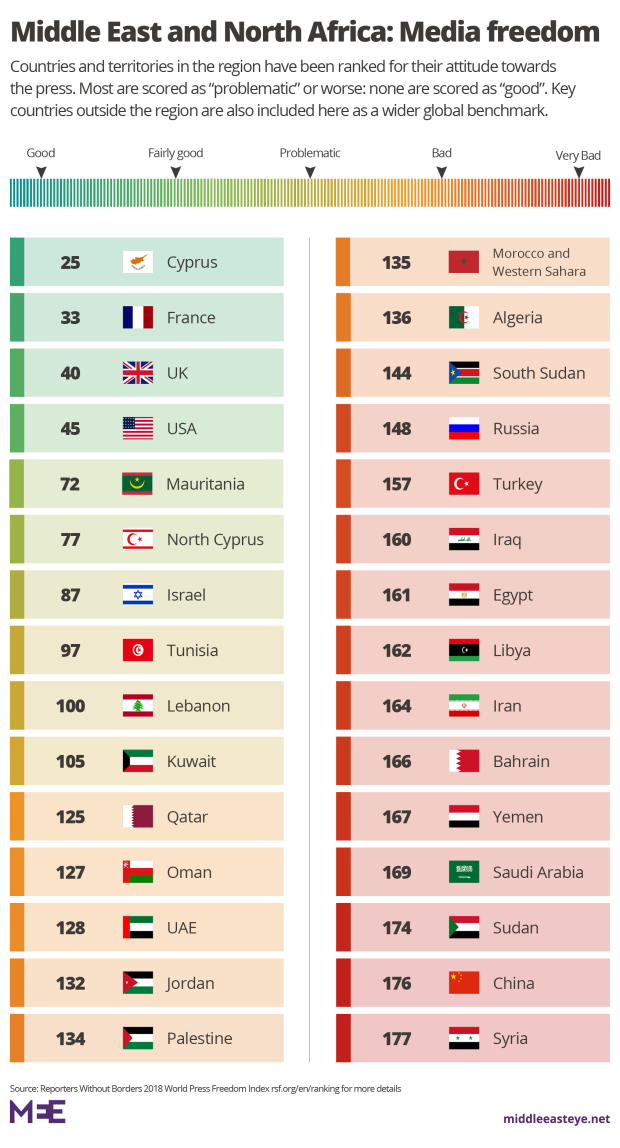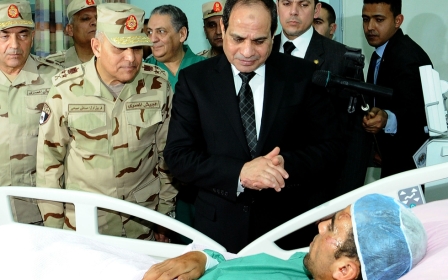'An assassination of journalism': Egypt passes controversial media laws
The Egyptian parliament approved on Monday three controversial media regulation laws which could see social media users monitored under the pretext of combatting fake news, in a move journalists and rights groups say will severely curtail press freedoms.
The laws were approved by a two-thirds majority and sent to President Abdel Fattah el-Sisi for ratification. Under the new laws, the Supreme Council of Media, a president-appointed body, is allowed to supervise media platforms and social media accounts that have more than 5,000 followers, including personal accounts.
"The new press law that was approved yesterday seems to set in stone repressive practices that were already in place in Egypt, effectively legalising new methods of cracking down on the freedom of information," Sophie Anmuth of Reporters Without Borders told Middle East Eye.
Under the new laws journalists will have to ask permission to attend events or even interview people on the street.
'The new press law that was approved yesterday seems to set in stone repressive practices that were already in place in Egypt'
- Sophie Anmuth, Reporters Without Borders
"Since this new legislation goes hand in hand with a wave of arrests of journalists that openly target media workers who collaborate with opposition media, it is a clear attempt at ensuring only the official version of current affairs appear in the media," Anmuth said.
The laws include the Law of the Organisation of Press, Media and the Supreme Council of Media, which regulates private media; the Law of the National Authority of Press, which regulates state-owned newspapers and news websites; and the Law of the National Authority of Media, which regulates state-owned TV channels and radio stations.
The Supreme Council of Media was established by Sisi in 2017 and has been criticised for attempting to silence journalists by referring them to disciplinary investigations.
Syndicate conflict
Half of the members of the board of the Syndicate of Journalists have threatened to resign from their positions in opposition to the law that was passed without taking their comments into account.
A draft law had been submitted to the Syndicate of Journalists and the High State Council for their feedback prior to passing the law.
'It is a sad day. Shame on all those who sold their consciousness and betrayed their profession'
- Yehia Qalash, ex- Syndicate of Journalists chairman
The chairman of the Syndicate of Journalists, Abdelmohsen Salamah, welcomed the laws, saying the parliament has responded positively to the body's comments.
However, six members of the Syndicate have voiced their rejection of the laws, saying the parliament allowed all articles that would restrict rights and freedoms to pass.
They also claimed the laws grant the Supreme Council the power to block permits for media establishments and silence journalists, replacing the current state authorities that are already clamping down on media freedoms.
The six members said in a statement that the laws allow the pre-trial detention of journalists and restricts their work by requiring them to obtain permits prior to attending any conferences or public meetings, a provision which the members said “would make it impossible to practice journalism”.
They called on the rest of the Syndicate board members to attend a general assembly on Tuesday to announce their position on what they called “the death penalty against journalism” and explain to journalists how they can deal with the new law. However, a media source told MEE this event was cancelled.
On 12 June, members of the so-called 25-30 parliamentary bloc denounced the draft Law of the Organisation of Press, Media and the Supreme Council of Media, saying its vague language could empower the body to control social media accounts and personal blogs in violation of the constitution.The parliamentary bloc said in a statement that the law “confiscates the last remaining spaces of freedom of expression, and violated Egypt’s international commitments through its unconstitutional articles and vague wording”.
On 2 June, Amnesty International criticised the draft laws saying they “would increase the Egyptian government's already broad powers to monitor, censor and block social media and blogs, as well as criminalize content that violates vaguely defined political, social or religious norms”.
Journalist and former Syndicate of Journalists chairman Yehia Qalash said in a Facebook post that the laws amount to “an assassination of the journalism profession”.
“It is a sad day. Shame on all those who sold their consciousness and betrayed their profession,” he said.
New MEE newsletter: Jerusalem Dispatch
Sign up to get the latest insights and analysis on Israel-Palestine, alongside Turkey Unpacked and other MEE newsletters
Middle East Eye delivers independent and unrivalled coverage and analysis of the Middle East, North Africa and beyond. To learn more about republishing this content and the associated fees, please fill out this form. More about MEE can be found here.





